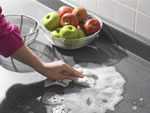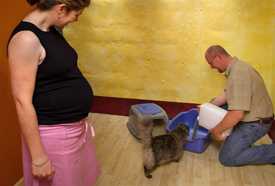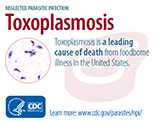Prevention & Control
People who are healthy should follow the guidelines below to reduce risk of toxoplasmosis. If you have a weakened immune system, please see guidelines for Immunocompromised Persons.
Reduce Risk from Food
To prevent risk of toxoplasmosis and other infections from food:
Cook food to safe temperatures. A food thermometer should be used to measure the internal temperature of cooked meat. Do not sample meat until it is cooked. USDA recommends the following for meat preparation.
For Whole Cuts of Meat (excluding poultry)
Cook to at least 145° F (63° C) as measured with a food thermometer placed in the thickest part of the meat, then allow the meat to rest* for three minutes before carving or consuming.
For Ground Meat (excluding poultry)
Cook to at least 160° F (71° C); ground meats do not require a rest* time.
For All Poultry (whole cuts and ground)
Cook to at least 165° F (74° C), and for whole poultry allow the meat to rest* for three minutes before carving or consuming.
*According to USDA, "A 'rest time' is the amount of time the product remains at the final temperature, after it has been removed from a grill, oven, or other heat source. During the three minutes after meat is removed from the heat source, its temperature remains constant or continues to rise, which destroys pathogens."
More on: Fight BAC: Safe Food Handling
- Freeze meat for several days at sub-zero (0° F) temperatures before cooking to greatly reduce chance of infection.
- Peel or wash fruits and vegetables thoroughly before eating.

Wash counter tops carefully. Photo courtesy of USDA.
- Wash cutting boards, dishes, counters, utensils, and hands with hot soapy water after contact with raw meat, poultry, seafood, or unwashed fruits or vegetables.
More on: Handwashing
The U.S. Government and the meat industry continue their efforts to reduce T. gondii in meat.
Reduce Risk from the Environment
To prevent risk of toxoplasmosis from the environment:
- Avoid drinking untreated drinking water.
- Wear gloves when gardening and during any contact with soil or sand because it might be contaminated with cat feces that contain Toxoplasma. Wash hands with soap and warm water after gardening or contact with soil or sand.
- Teach children the importance of washing hands to prevent infection.
- Keep outdoor sandboxes covered.

Have someone else clean the litter box. (CDC Photo)
- Feed cats only canned or dried commercial food or well-cooked table food, not raw or undercooked meats.
- Change the litter box daily if you own a cat. The Toxoplasma parasite does not become infectious until 1 to 5 days after it is shed in a cat's feces. If you are pregnant or immunocompromised:
- Avoid changing cat litter if possible. If no one else can perform the task, wear disposable gloves and wash your hands with soap and warm water afterwards.
- Keep cats indoors.
- Do not adopt or handle stray cats, especially kittens. Do not get a new cat while you are pregnant.
- Page last reviewed: January 10, 2013
- Page last updated: January 10, 2013
- Content source:



 ShareCompartir
ShareCompartir